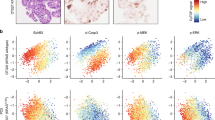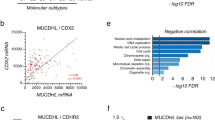Abstract
We have examined the function of the epidermal growth factor (EGF) receptor, c-Src and focal adhesion kinase (FAK) in the progression of colon cancer using an in vitro progression model. A non-tumorigenic cell line was derived from a premalignant colonic adenoma (PC/AA) from which a clonogenic variant was established (AA/C1). Following sequential treatment with sodium butyrate and the carcinogen N-methyl-N′-nitro-N-nitrosoguanidine an anchorage-independent line was isolated which, with time in culture, became tumorigenic when injected into athymic nude mice (AA/C1/SB10). We have shown that both EGF receptor and FAK protein levels were elevated in the carcinoma cells as compared to the adenoma cells, while the expression and activity of c-Src were unaltered during the adenoma to carcinoma transition. EGF induced the movement of the carcinoma cells into a reconstituted basement membrane which was not seen with the premalignant adenoma cells. This increased motility was accompanied by an EGF-induced increase in c-Src kinase activity, relocalisation of c-Src to the cell periphery and phosphorylation of FAK in the carcinoma cells but not in the adenoma cells. This suggests that c-Src plays a role in the biological behaviour of colonic carcinoma cells induced by migratory factors such as EGF, perhaps acting in conjunction with FAK to regulate focal adhesion turnover and tumour cell motility. Furthermore, although c-Src has been implicated in colonic tumour progression, we demonstrate here that in the adenoma to carcinoma in vitro model c-Src is not the driving force for this progression but co-operates with other molecules in carcinoma development.
This is a preview of subscription content, access via your institution
Access options
Subscribe to this journal
Receive 50 print issues and online access
$259.00 per year
only $5.18 per issue
Buy this article
- Purchase on Springer Link
- Instant access to full article PDF
Prices may be subject to local taxes which are calculated during checkout
Similar content being viewed by others
Author information
Authors and Affiliations
Rights and permissions
About this article
Cite this article
Brunton, V., Ozanne, B., Paraskeva, C. et al. A role for epidermal growth factor receptor, c-Src and focal adhesion kinase in an in vitro model for the progression of colon cancer. Oncogene 14, 283–293 (1997). https://doi.org/10.1038/sj.onc.1200827
Received:
Revised:
Accepted:
Issue Date:
DOI: https://doi.org/10.1038/sj.onc.1200827
Keywords
This article is cited by
-
Tissue-resident stem cell activity: a view from the adult Drosophila gastrointestinal tract
Cell Communication and Signaling (2017)
-
Src kinase function controls progenitor cell pools during regeneration and tumor onset in the Drosophila intestine
Oncogene (2015)
-
Src activity is modulated by oxaliplatin and correlates with outcomes after hepatectomy for metastatic colorectal cancer
BMC Cancer (2014)
-
The actin-bundling protein fascin is overexpressed in colorectal adenomas and promotes motility in adenoma cells in vitro
British Journal of Cancer (2009)
-
Histone deacetylase 3 localizes to the plasma membrane and is a substrate of Src
Oncogene (2006)



